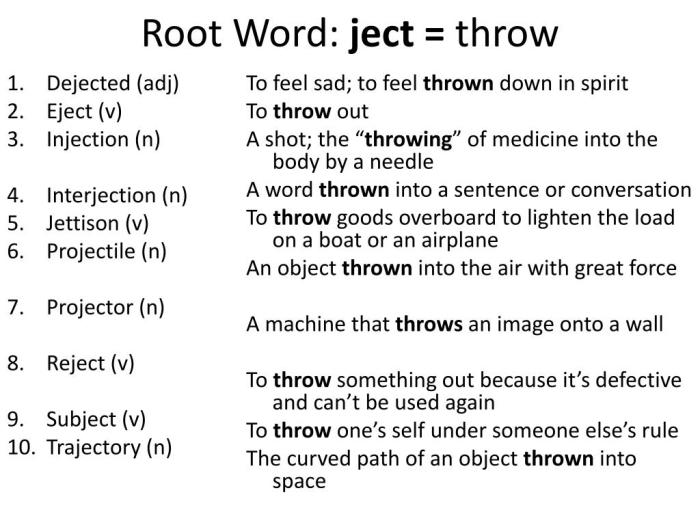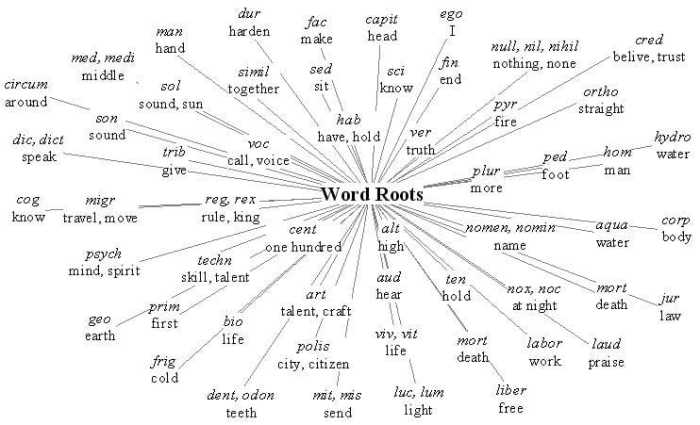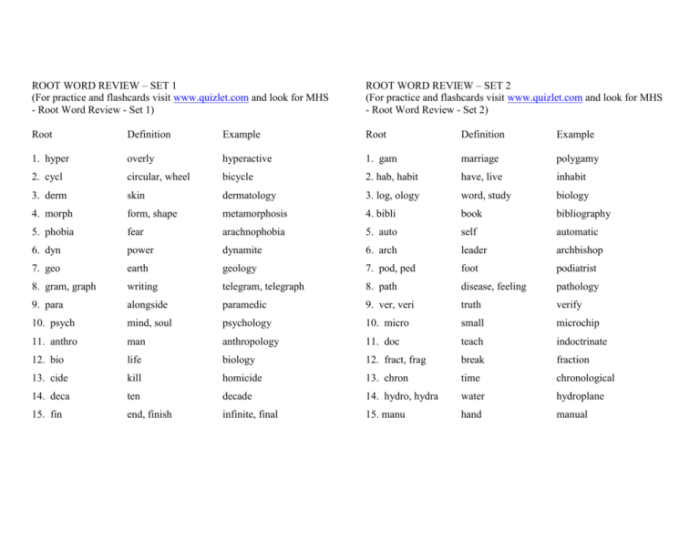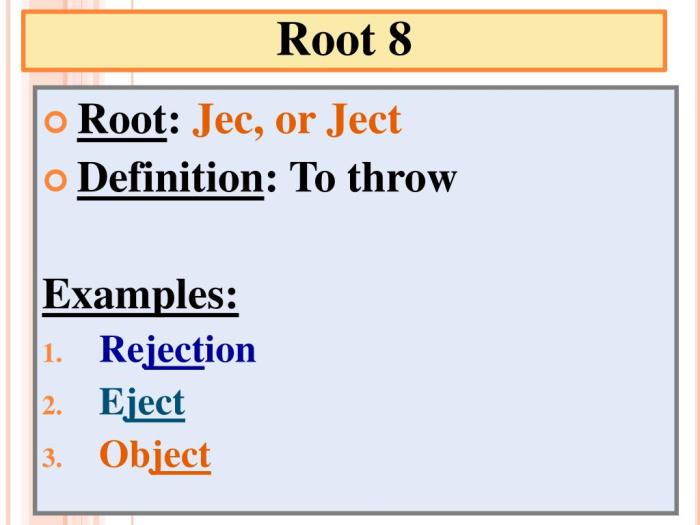Words with the root word ject – Words with the root word ‘ject’ possess a rich history and diverse applications, inviting us on an etymological, morphological, and semantic journey that unravels their origins, grammatical functions, and subtle nuances of meaning.
These words, such as ‘eject,’ ‘object,’ and ‘project,’ have shaped our language and understanding of the world around us, leaving an indelible mark on literature, culture, and society.
Etymology of Words with the Root Word ‘ject’

The root word ‘ject’ originates from the Latin verb ‘jacere’, meaning ‘to throw or cast’. It has undergone various semantic shifts and variations in meaning over time, giving rise to a diverse range of words with distinct connotations.
Historical Usage and Semantic Shifts
In its earliest usage, ‘ject’ referred to the physical act of throwing or casting an object. This sense is preserved in words like ‘eject’ (to throw out) and ‘inject’ (to throw in). Over time, the meaning of ‘ject’ expanded to include more abstract concepts, such as the idea of casting or directing something in a particular direction.
Examples of Derived Words
The root word ‘ject’ has given rise to a wide range of words with diverse meanings, including:
- Eject: To throw or force out
- Inject: To introduce or insert by force
- Object: To express opposition or disagreement
- Subject: To place under the authority or control of another
- Project: To throw or cast forward
Semantic Variations
The semantic variations of words with the root word ‘ject’ are often subtle but significant. For example, ‘eject’ and ‘inject’ both involve the act of throwing, but ‘eject’ implies a forceful removal, while ‘inject’ suggests a more controlled insertion.
Morphological Analysis of ‘ject’

The root word ‘ject’ is associated with various parts of speech, including verbs, nouns, and adjectives. In its verbal form, ‘ject’ commonly appears as a suffix, indicating the act of throwing or casting. As a noun, it refers to an object or device used for throwing, while as an adjective, it describes something as being thrown or projected.
Grammatical Functions and Syntactic Roles
Words with the root word ‘ject’ play distinct grammatical roles in sentences. Verbs with the ‘ject’ suffix, such as ‘inject’, ‘eject’, and ‘project’, typically function as transitive verbs, requiring a direct object to complete their meaning. For instance, in the sentence “The doctor injected the patient with antibiotics,” “inject” is a transitive verb that takes “patient” as its direct object.
Nouns derived from ‘ject’, such as “injector” or “projectile,” function as common nouns, referring to specific objects or devices used for throwing or casting. In the sentence “The injector was used to administer the medication,” “injector” is a common noun that identifies the instrument used for injection.
Adjectives with the ‘ject’ root, such as “ejectable” or “projectable,” modify nouns to describe their ability to be thrown or projected. For example, in the sentence “The pilot ejected from the damaged aircraft,” “ejectable” is an adjective that modifies “pilot,” indicating that the pilot has the ability to be ejected from the aircraft.
Morphological Patterns and Affixes
The root word ‘ject’ often combines with prefixes and suffixes to form new words with specific meanings. Common prefixes used with ‘ject’ include “e-” (out), “in-” (into), “pro-” (forward), and “re-” (back). For instance, “eject” means to throw out, “inject” means to throw into, “project” means to throw forward, and “reject” means to throw back.
Suffixes commonly used with ‘ject’ include “-ion” (action or process), “-ment” (result), and “-or” (agent). For example, “injection” refers to the action or process of injecting, “ejection” refers to the result of ejecting, and “injector” refers to the agent that performs the action of injecting.
Semantic Relationships among Words with ‘ject’

Words with the root word ‘ject’ share a common core meaning of ‘throwing’ or ‘casting’. However, they differ in their specific semantic nuances and applications. To understand these relationships better, let’s group them into semantic categories based on their shared meanings:
Object Manipulation
Words in this category involve the physical act of throwing or casting an object. They include:
- Eject: To force something out or expel it.
- Inject: To introduce a substance into something using a syringe or needle.
- Project: To send something forward or outward, often with force.
- Reject: To refuse to accept or approve something.
Psychological States
This category includes words that describe psychological states or reactions:
- Deject: To cause to feel low or sad.
- Object: To express opposition or disapproval.
- Subject: To place under authority or control.
Communication
Words in this category relate to the act of communicating or expressing oneself:
- Ejaculate: To expel semen or other fluids.
- Interject: To insert a remark or comment into a conversation.
- Reject: To refuse to accept or believe something.
Contextual Usage of ‘ject’

The root word ‘ject’ is versatile, adapting to various contexts, influencing the meaning and interpretation of words it forms. Cultural and social factors further shape its usage.
Impact of Context
Consider the word ‘eject’. In aviation, it denotes the forced removal of an aircraft from the runway, while in computing, it refers to expelling data from a system. The specific context determines the precise meaning.
Cultural and Social Factors
The usage of words with ‘ject’ is influenced by cultural and social norms. For instance, in formal settings, ‘object’ is often used to express disapproval or resistance, whereas in informal contexts, it may simply convey a difference of opinion.
Comparative Analysis of Words with ‘ject’: Words With The Root Word Ject
Words with the root word ‘ject’ share a common semantic core related to the idea of ‘throwing’ or ‘projecting’. However, they differ in their specific meanings, usage, and etymological origins. By comparing and contrasting these words with similar words with different roots, we can gain insights into the semantic landscape of the English language and the ways in which words evolve and acquire new meanings.
Similar Words with Different Roots
Words with the root word ‘ject’ can be compared to a range of similar words with different roots that share related meanings. These include words like ‘throw’, ‘cast’, ‘launch’, and ‘propel’. While these words all involve the idea of sending something through the air, they differ in their specific connotations and usage.
For example, ‘throw’ implies a casual or informal action, while ‘cast’ suggests a more deliberate or controlled movement. ‘Launch’ typically refers to the beginning of a journey or project, while ‘propel’ emphasizes the use of force to move something forward.
Semantic Similarities and Differences
Despite their differences, words with the root word ‘ject’ and their counterparts share certain semantic similarities. They all involve the notion of movement or projection, whether it be physical or metaphorical. However, they differ in the specific nature of the movement and the objects being moved.
For example, ‘eject’ refers to the forcible removal of something, while ‘project’ involves sending something forward into space. ‘Inject’ implies the introduction of a substance into something, while ‘subject’ refers to the act of placing something under the control or influence of another.
Etymological Comparisons
The etymological origins of words with the root word ‘ject’ and their counterparts also provide insights into their semantic development. The root ‘ject’ itself is derived from the Latin word ‘jacere’, meaning ‘to throw’. This root is shared by a number of English words, including ‘reject’, ‘object’, and ‘eject’.
In contrast, words like ‘throw’, ‘cast’, and ‘launch’ have Germanic origins, reflecting the influence of different linguistic traditions on the English language.
Implications for Understanding the Semantic Landscape
The comparative analysis of words with the root word ‘ject’ and their counterparts highlights the complexity and diversity of the English language. It demonstrates how words with similar meanings can have different origins, connotations, and usage patterns. This analysis also sheds light on the ways in which words evolve and acquire new meanings over time, reflecting the changing needs and perspectives of language users.
By understanding the semantic relationships between words, we can better appreciate the richness and expressiveness of the English language.
Cultural and Historical Significance of ‘ject’

Words with the root word ‘ject’ have played a significant role in shaping cultural narratives and historical events. These words have often been used to describe the act of throwing or casting something, and they have come to represent a wide range of concepts, from physical actions to emotional states.
One of the most famous examples of a word with the root word ‘ject’ is the word ‘object’. This word has been used for centuries to describe a physical thing, but it has also come to be used in a more abstract sense to refer to something that is opposed or resisted.
In this sense, the word ‘object’ can be used to describe a person, an idea, or even a government.
Another example of a word with the root word ‘ject’ is the word ‘project’. This word is often used to describe a plan or undertaking, but it can also be used to describe something that is thrown or cast forward.
In this sense, the word ‘project’ can be used to describe a new idea, a new product, or even a new way of life.
Words with the root word ject, like “reject” and “eject,” often involve a sense of discarding or dismissing. They convey a decisive action, like when you “reject” a proposal or “eject” a malfunctioning part. Interestingly, the phrase “ride a stearns and be content” ( ride a stearns and be content ) suggests a more passive and accepting attitude, embracing contentment even in humble circumstances.
It reminds us that fulfillment can sometimes be found in unexpected places, even in the act of “rejecting” or “ejecting” our expectations.
The words ‘object’ and ‘project’ are just two examples of the many words with the root word ‘ject’ that have played a significant role in shaping cultural narratives and historical events. These words have been used to describe everything from the physical world to the human experience, and they continue to be used today to express a wide range of ideas and emotions.
Examples of Words with the Root Word ‘ject’ that Have Played a Significant Role in Shaping Cultural Narratives or Historical Events
- Object: This word has been used for centuries to describe a physical thing, but it has also come to be used in a more abstract sense to refer to something that is opposed or resisted.
- Project: This word is often used to describe a plan or undertaking, but it can also be used to describe something that is thrown or cast forward.
- Eject: This word is used to describe the act of throwing or casting something out.
- Reject: This word is used to describe the act of refusing or opposing something.
- Subject: This word is used to describe something that is under the control or influence of something else.
These are just a few examples of the many words with the root word ‘ject’ that have played a significant role in shaping cultural narratives and historical events. These words have been used to describe everything from the physical world to the human experience, and they continue to be used today to express a wide range of ideas and emotions.
Literary and Artistic Applications of ‘ject’
Words with the root word ‘ject’ find extensive use in literature and art, contributing to the richness and depth of creative expression. These words evoke powerful emotions, create vivid imagery, and convey complex ideas.
Metaphors and Similes
Metaphors and similes employ words with the root word ‘ject’ to create evocative comparisons. For instance, the phrase “her heart was injected with hope” metaphorically depicts the infusion of optimism into a person’s being.
Aesthetic and Expressive Qualities
The aesthetic and expressive qualities of words with the root word ‘ject’ stem from their inherent connotations. Words like “eject” and “reject” convey a sense of force and expulsion, while “project” and “subject” suggest a sense of projection and submission.
Creative Works, Words with the root word ject
In literary works, words with the root word ‘ject’ enhance character development and plot progression. In “The Catcher in the Rye,” Holden Caulfield’s constant use of the word “phony” reflects his disillusionment with society. In art, words with the root word ‘ject’ inspire visual representations, such as paintings depicting the act of projecting or rejecting.
FAQ Corner
What is the origin of the root word ‘ject’?
The root word ‘ject’ originates from the Latin verb ‘jacere,’ meaning ‘to throw.’ Over time, it has evolved to encompass a wide range of meanings related to throwing, casting, or projecting.
How do words with the root word ‘ject’ function grammatically?
Words with the root word ‘ject’ can serve as verbs, nouns, or adjectives. As verbs, they often indicate an action of throwing or casting, while as nouns, they refer to the object or result of such an action. As adjectives, they describe something as being thrown or projected.
What are some common semantic relationships among words with the root word ‘ject’?
Words with the root word ‘ject’ often share semantic relationships related to movement, direction, and opposition. For example, ‘eject’ and ‘project’ both involve moving something away, while ‘object’ and ‘reject’ imply resistance or opposition.